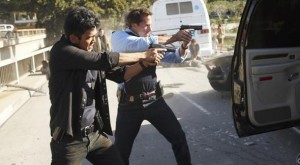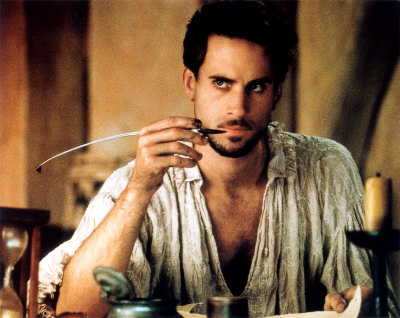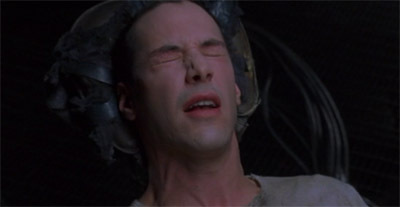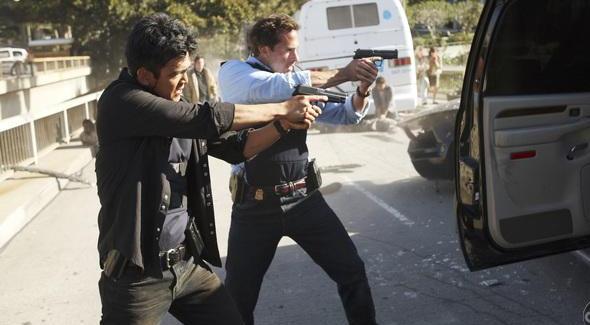
Since Aristotle (and probably before that), humans have asked themselves: Do we really have free will? ABC is currently attempting an interesting answer to that question with its new show, FlashForward. In doing so, they inadvertently make Joseph Fiennes a god.

In the beginning was the word...
From Schopenhauer to Neo to the creators of Lost, everyone has weighed in on this particular argument, breaking down into two camps: those who believe our actions are determined (by god, genetics, history, character) and those who believe that we have the freedom to choose our actions.

I know Aristotelian metaphysics.
Religion plays an interesting part in this debate, especially when you’re talking about an infallible, omniscient god, the Judeo-Christian version with a capital G. If God knows everything, then on February 13, 1929, God knew that the next day Al Capone was going to kill 5 members of a rival gang. Since God knew this and can’t possibly be wrong, Al Capone had no choice but to give the order to kill those men. He may have debated the pros and cons in his head, but because God is infallible and all knowing, that mental argument was only the illusion of free will. The Valentines Day Massacre was going to happen and Bugs Moran was a goner. This is called Theological Fatalism.
The interesting thing about Theological Fatalism (or really, any of the fatalisms) is that it takes responsibility out of our hands. How can Al Capone be responsible for killing those men when he really had no choice in the matter? How can I be held responsible for getting this philosophical summation wrong when I got a D in freshman philosophy and still decided to write about this? Are Al and I morally culpable?
Obviously, in a religion in which morality plays a big role, it was important that someone jive the seeming double jeopardy of God determining your actions, then judging you for them. Saint Augustine, Aquinas, and a host of others have attempted to do so. For a full accounting of their arguments, click here, but it basically comes down to this: God stands outside of time, therefore his knowledge is not technically foreknowledge and Also, God can know what you’re going to do because he knows everything about you and can predict your actions to a certainty without determining them.

I’m wondering why no one has suggested to the people without visions that they will be asleep in the future. I can’t recall anything about people seeing themselves asleep or experiencing a dream.
**SPOILER**
Of course, that wouldn’t explain why Zoey insists she saw Dimitri at their wedding and he saw black; but we haven’t seen all of her flashforward, just pieces (flashes of the flash, so to speak) of it, so she could just be seeing *a* wedding and not *their* wedding. And I suppose at this point maybe Aaron Stark saw a dream, but the preview makes it look like he’s about to find her really soon… Gah.
I’d say Al’s killing himself effects more than just his and the woman’s lives. There are her kids, too- whatever they saw or didn’t see will theoretically change; Agent Kingston (the gal from MI6) put tape on the window already, and she obviously won’t be in the meeting with Al, since he’s, you know, dead; and anyone the mother, her kids, and Kingston will now be able to interact with will experience something different than their flashforward(s), too. Once I got over the “NOOOO!” moment, I realized the ramifications of his suicide could be rather large.
But I want to talk about the Russian roullette a bit deeper. At first I thought he did it because, as you put it, he was “secure in the knowledge that his vision of himself in the future mean[t] he couldn’t die” when he had the gun to his chin. After all, that’s what he says to the other guys. But then I thought about it and realized he could also have felt secure in the knowledge that his vision *wouldn’t matter* because he had already planned on killing himself. What if, to him, it didn’t make a difference how or where he died, since he knew he’d commit suicide soon, anyway? If that’s the case, it would seem as though he and thus every other character has total agency over their future. Dimitri could just hide himself away somewhere for a few days before the day of his murder; Mark could simply not go to the office and (not-so-simply) avoid drinking; etc.
Either way, Al’s suicide gave at least Kingston presumed agency, since, again, she went and put the tape on the window. Unless someone takes it off and she doesn’t put it back on, that has been changed. And Mark burned that bracelet, so we’ll have to wait and see if he gets another one, but if not, there’s another example.
*Spoiler alert with reference to the original novel rather than the show, which may, depending upon how the show goes, might also be future spoilers thereof*
Okay, so I’ve not seen the show, but having read this article, as well as the original novel (Which is excellent by the way) it’s pretty much a given in the novel that no vision meant dead, but that additionally, visions were changable by explicit human agency (Characters who -had- visions with which they were dissatisfied suicided, rendering the vision invalid)
Which raises the question, I suppose, as to whether or not people who experienced no vision could in fact have ended up still alive through relevant action (Though in the novel, the flash foward is over 20 years, rather than 6 months, and -many- very old people experienced no vision, which is what made it a lot more conclusive to the people in the novel that no vision meant dead)
In the novel, they also find out exactly what caused the flashforward, and plan to make another one happen, with results that continue to suggest no vision universally meant dead.
Another potential interpretation of the visions in the flashforward reminds me of a concept that I recently saw described in Neal Stephenson’s Anathem. If you consider the many-worlds theory of quantum mechanics, (The one that suggests that any time a choice is made, additional universes are spun off in which each of those choices took place) you could end up with a situation where each person experiences a vision of a “possible” or even “very likely” future. Something along the lines of “If things go how they are going, this is what you will end up as” so it’s not set in stone, but it is very likely. People who accept their vision as fated or factual will likely have that borne out because they won’t make any drastic changes in their life. Those who don’t accept it and takes steps to the contrary can avertit.
This gets people who end up experiencing exactly what they saw, people who have averted what they saw, and people who were ‘dead’ that might not end up that way, and people who were alive who ended up dead.
The reason some people experienced no vision at all could well be that there -were- no -likely- futures in which they were alive. It isn’t necessarily a -fated deterministic FACT- that they die, but like a world in which gravity works backwards, or americans give up the right to bear arms, there is just no -plausible- set of circumstances that would bring that world into existance, and so they saw nothing.